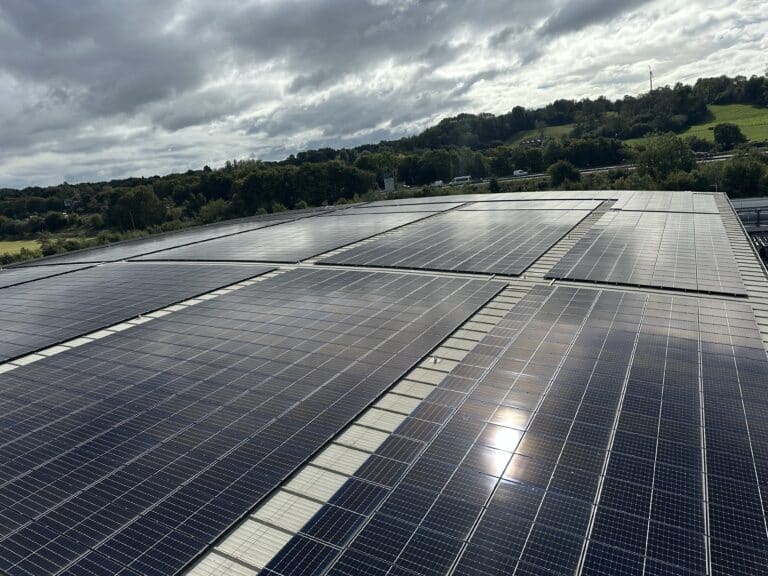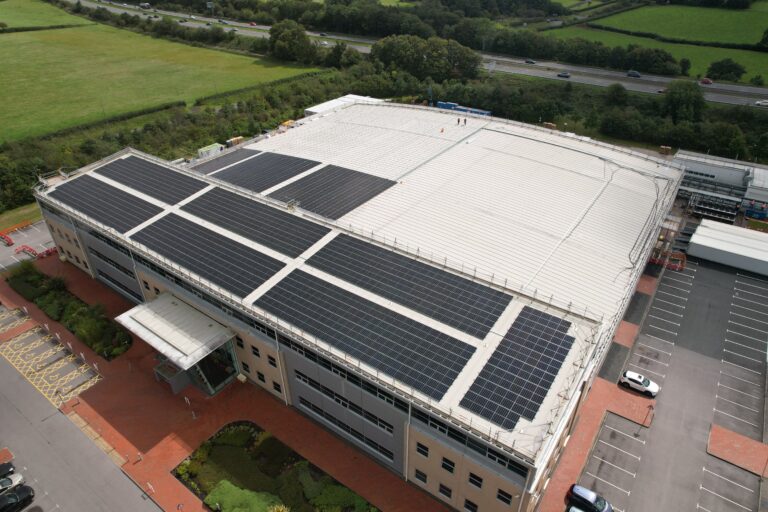Decarbonisation Strategy for UK Businesses: Planning for a Sustainable Future
A decarbonisation strategy for UK businesses is a structured plan to reduce carbon emissions through energy efficiency, renewable adoption, and sustainable operations to meet net-zero goals by 2050.
Businesses across all sectors, from public institutions and manufacturing to transport, logistics, and retail, must now implement structured decarbonisation plans to remain competitive, meet compliance obligations, and build long-term operational resilience.
This article examines the current state of energy transition and decarbonisation in the UK, the responsibilities businesses face, and practical steps to create a strong industrial decarbonisation strategy.

What Is The Current NetZero and Decarbonisation Landscape in the UK
The UK government has set a legally binding goal to reach Net Zero greenhouse gas emissions by 2050. This effort is part of a larger European initiative to reduce carbon emissions, supporting EU targets for 2030 and 2050. Key measures include:
Decarbonisation of the grid:
Increasing the share of low-carbon energy sources like wind, solar, and nuclear while moving away from fossil fuels.
Energy transition in industrial sectors:
Encouraging heavy industries, such as steel, cement, and chemicals, to use cleaner technologies.
Mandatory reporting and compliance:
Companies that exceed certain energy limits must track and report emissions through programs like Streamlined Energy and Carbon Reporting (SECR) and the Energy Savings Opportunity Scheme (ESOS).
Businesses must now incorporate decarbonisation into their operations, from energy purchasing to supply chain management. The government highlights industrial decarbonisation, energy decarbonisation, and overall energy sector decarbonisation as vital steps to achieving climate goals.
Key Business Sectors and Decarbonisation Priorities
Industrial and Manufacturing
Industries like steel, engineering, chemicals, and pharmaceutical have major challenges with decarbonisation because they use a lot of energy. An industrial decarbonisation strategy focuses on:
✅ Switching to low-carbon fuels and electrifying processes
✅ Using energy-efficient machinery
✅ Capturing and storing carbon emissions where possible
Supply Chain and Warehousing
Logistics and warehousing need to tackle fuel consumption, refrigeration, and electricity use. Improving transport routes, using electric or hydrogen-powered fleets, and upgrading warehouses for energy efficiency are key parts of industrial decarbonisation.
Transportation and Shipping
The transport and shipping sectors add significantly to emissions. Companies should invest in cleaner fuels, hybrid or electric vehicles, and decarbonising the grid to ensure the energy they use is low carbon.
Leisure, Retail, and Health Care
From hospitals to retail chains, energy efficiency, sustainable building design, and using renewable energy sources are vital to energy transition and decarbonisation efforts. Energy management plans for hospitals and carbon audits for retail stores are becoming more common due to demands from stakeholders and regulators.
Public Sector
Public organisations should set a good example by ensuring their buildings are energy-efficient, their vehicle fleets have low emissions, and their procurement is sustainable. Decarbonisation planning involves upgrading public buildings, investing in renewable energy, and working with government-funded energy efficiency programs.
Farming
Agriculture faces specific pressures for decarbonisation, including reducing methane, integrating renewable energy, and managing land sustainably. Farmers are encouraged to create decarbonisation plans for their machinery, fertiliser use, and energy systems.

Compliance Requirements and Strategic Planning
To align with UK decarbonisation strategy, businesses must focus on three primary areas:
✅ Energy Monitoring and Reporting – Track energy usage, emissions, and efficiency across operations.
✅ Carbon Reduction Targets – Set sector-specific, measurable targets in line with national NetZero goals.
✅ Investment in Low-Carbon Solutions – From solar PV installations to heat pumps and electric fleets, businesses must prioritise clean energy adoption.
Sector | Decarbonisation Focus | Key Action Points |
Public Sector | Energy efficiency, renewable adoption | Retrofits, low-carbon procurement, SECR compliance |
Steel / Heavy Industry | Industrial decarbonisation, emissions reduction | Electrification, carbon capture, process optimisation |
Warehousing / Supply | Operational energy reduction, fleet decarbonisation | Route optimisation, EV adoption, energy-efficient lighting |
Transportation / Shipping | Fuel switching, low-carbon operations | Hybrid/electric vehicles, shipping efficiency |
Leisure / Retail | Building energy efficiency, carbon footprint reduction | Solar PV, heat pumps, efficient HVAC systems |
Healthcare / Hospitals | Low-carbon operations, energy management | Energy audits, renewable adoption, efficient equipment |
Farming / Agriculture | Sustainable land use, machinery emissions reduction | Renewable energy, electrification, efficient fertilisers |
What Are the Industrial Decarbonisation Strategy Practical Steps
For organisations looking to implement a complete industrial decarbonisation strategy, practical steps include:
✅ Assess Energy Baseline – Identify current energy usage and emissions.
✅ Set Targets and KPIs – Develop clear targets aligned with UK NetZero goals.
✅ Prioritise Interventions – Focus on high-impact measures such as electrification, renewable energy, and energy efficiency upgrades.
✅ Integrate into Business Strategy – Embed decarbonisation planning into operations, finance, and supply chain management.
✅ Monitor Progress – Regularly measure, report, and adjust strategy to stay on course.
✅ Engage Stakeholders – Involve employees, suppliers, and investors to support energy decarbonisation and broader ESG goals.
Adopting a structured energy decarbonisation approach ensures long-term resilience, operational savings, and alignment with regulatory obligations.
UK Decarbonisation and European Union Alignment
The UK’s decarbonisation strategy does not exist in isolation. Although the UK has exited the European Union, alignment with EU decarbonisation targets remains critical for businesses engaged in cross-border trade. EU regulations and incentives encourage:
✅ Investment in low-carbon industrial technologies
✅ Reporting transparency on emissions
✅ Sustainable supply chain management
Aligning UK operations with EU expectations can help companies secure trade advantages, reduce compliance risk, and demonstrate leadership in industrial decarbonisation.
How Excel Energy Can Support Your Decarbonisation Planning
Excel Energy specialises in guiding businesses across sectors to achieve sustainable, cost-effective decarbonisation. Our services include:
✅ Developing detailed decarbonisation strategy roadmaps
✅ Conducting energy audits and carbon baseline assessments
✅ Planning and implementing industrial decarbonisation strategies
✅ Supporting energy transition and decarbonisation initiatives in line with government and EU targets
✅ Facilitating investment in renewable energy, storage, and efficiency upgrades
Service Area | Benefit to Your Business |
Decarbonisation Planning | Clear, actionable roadmap aligned with UK and EU targets |
Industrial Decarbonisation | Reduce emissions, improve operational efficiency |
Energy Transition Solutions | Reliable, low-carbon energy supply for long-term resilience |
Regulatory Compliance Support | Meet SECR, ESOS, and NetZero reporting requirements |
Financial and ESG Advisory | Identify incentives, grants, and funding to boost ROI |
Drive NetZero Success with Strategic Energy Planning
To sum up, adopting a structured decarbonisation strategy is essential for UK businesses. Companies across all sectors, including public institutions, manufacturing, logistics, healthcare, and agriculture, must take practical steps that meet national and European goals.
Having a structured industrial decarbonisation plan ensures companies follow regulations and helps save costs, improve operations, and build trust in their environmental, social, and governance efforts.
For businesses ready to act, Excel Energy offers detailed, tailored solutions to help with energy decarbonisation.
